Laughter, Tears, and Gratitude at ALA Youth Media Awards Ceremonies | ALA 2014
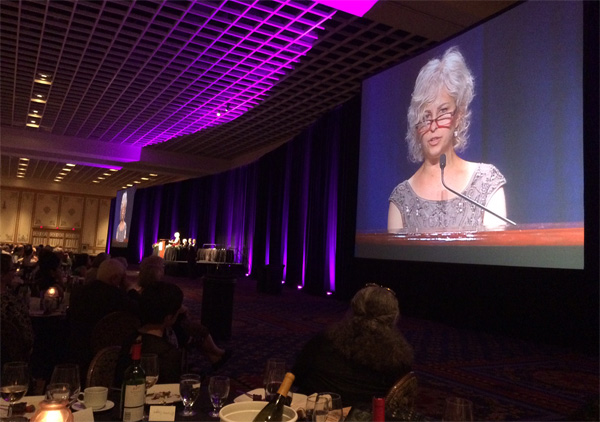
Newbery winner Kate DiCamillo at the Newbery-Caldecott banquet. Photo by Robin Brenner.
I had the good fortune this year to attend two of youth literature’s top awards ceremonies while at the American Library Association (ALA) Annual Conference in Las Vegas: the Michael L. Printz Program and Reception and the Newbery-Caldecott Banquet. Since I am a teen librarian, the Printz has always been a top priority for me when attending ALA Annual, but this was the first year I'd attended the Newbery-Caldecott, having been graciously invited to one of Scholastic's tables. Librarians, publishers, and the Printz Award honorees gathered in the ballroom of the slightly surreal Paris Hotel, and as Printz Award winner Marcus Sedgwick, being honored for Midwinter Blood, took the stage to speak, he charmed everyone by presenting his speech in six chapters: the first chapter on the boost in confidence that winning such recognition gives writers as creators doubtful of their own skill. In his ensuing chapters, he heralded the importance of libraries as refuges for young readers, recalled being a young man plagued by “trolls”—otherwise known as the bullies from the school across town who barred his way across the bridge from school to the library—and voiced appreciation for the recognition of his structurally complex Midwinter Blood and saw it as an acknowledgment that it is necessary for authors to take risks. "One of the worst things an author can do is treat his readers as stupid," he said, also dismissing the recent hullabaloo shaming readers of young adult literature, and advocated for novels as a necessary avenue for facing monsters. So many readers grow up In a world telling them to clam up about the dark happenings in their lives, encouraging them to suppress their fears, and novels are one place uneasy readers can and do turn.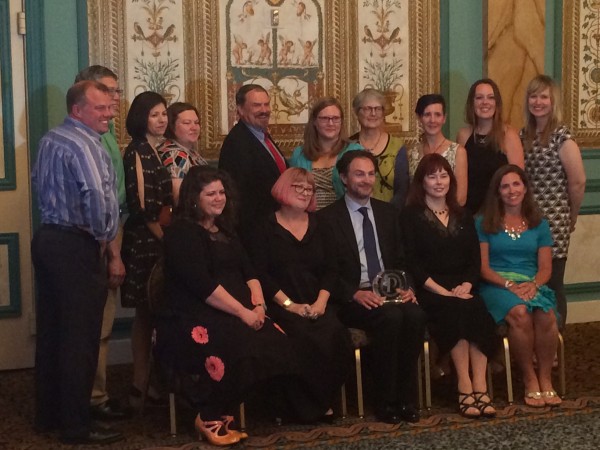
The Printz committee and all honorees. Winner Marcus Sedgwick sits center front. Photo by Robin Brenner.
After a standing ovation from the crowd, Sedgwick joined the honorees Susann Cokal (The Kingdom of Little Wounds), Sally Gardner (Maggot Moon), Rainbow Rowell (Eleanor and Park), and Clare Vanderpool (Navigating Early) for a panel discussion moderated by Booklist’s Gillian Engberg. The questions were selected from teens and librarians across the country. The first and most basic question asked why each chose to write for teens, and the consensus seemed to be that none of them expressly did—they were writing for themselves more than anyone else. Rowell noted that in her past life as a newspaper reporter, she had six editors to please, and “…no one joke will make six people laugh.” Sedgwick added, “When you write a book that at least you enjoy, someone else might like it too.”
Questions ran to what other arts inspired the panel. Sedgewick shared the Carl Larsson painting Midvinterblot, or Midwinter Sacrifice, led to his book. “You always say you’re never going to write about a painting. Then art comes and grabs you,” Gardner drew inspiration from her work in theater, and had the room giggling with a tale involving children yelling out the obvious when a theater performance went hilariously awry. Cokal emphasized the importance of world building, no matter the genre or format, and said all arts are about creating a world that feels real. Towards the end of the panel, the authors contemplated what makes them sad and how writing helps them process the emotion. “We write to see the beauty in the sadness,” Sedgwick said. “To try to find both of those two things.” Vanderpool added, “Writing helps call up things that are forgotten.” Once the formal panel finished, it was time to celebrate with tasty desserts and mingle with the authors, their editors, and crowds of well-wishers. My final memory of the evening was observing previous Printz Award winner Gene Luen Yang (Boxers & Saints), fellow cartoonist Thien Pham (Sumo), and Rainbow Rowell (Eleanor & Park) mugging for the camera for one final snapshot.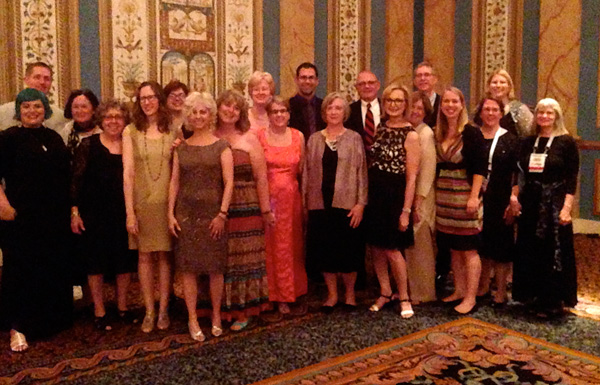
Newbery and Caldecott Award winners, honorees, and judges.
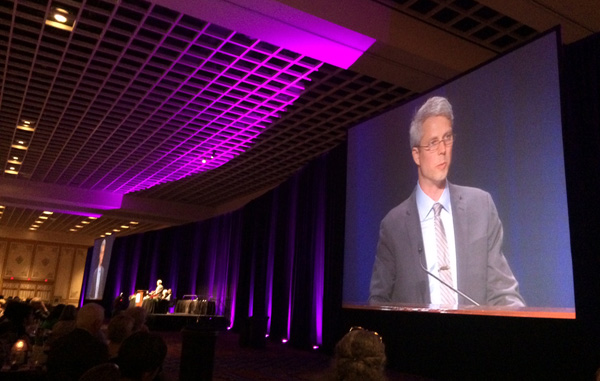
Caldecott winner Brian Floca at the Newbery-Caldecott banquet. Photo by Robin Brenner.
Floca was wise to speak the language of librarians by listing two call numbers noting the uncomfortable lack of sequence between 741.6, illustrators like himself, and 808.51, public speaking. Nonetheless, he forged ahead. He spoke of the challenge he felt in constructing the winning Locomotive, of trying to capture the power of landscape, travel, and home. Through mountains of research, so much of which is evident in the pages of this book, he worked to pull out the details and an understanding of the past that would underscore the drive to travel.Travel, he noted, is full of tension, “the tension between the desire to stay in one place, to stay true to who we are, and the desire to leave that place and to risk becoming someone new, to become who we might be.” Floca spoke about his determination to figure out a way to demystify a past era and make it an immediate experience for young readers—to try to“ ignite in that audience how alive and vibrant history can feel.” The author expressed gratitude for the recognition of a title that he struggled to make both accurate and beautiful, and in his acknowledgments, he thanked librarians for making space for books—“the kind that takes its time, that goes forward in a seemingly deeply impractical way, more concerned with trying to make the best book than anything else.”
Holly Black (Doll Bones), Kevin Henkes (The Year of Billy Miller), Amy Timberlake (One Came Home), and Vince Vawter (Paperboy) came forward to accept their honors, and the clapping and cheering was delightfully raucous—Henkes had an entire table waving Billy Miller hats in his character’s honor.
Kate DiCamillo then rose to give her acceptance speech for the Newbery Award for Flora and Ulysses: The Illuminated Adventures. The audience might have expected, given DiCamillo’s bright sense of humor, a speech to make them laugh, but by the end of her speech, many of us were sniffling and reaching for tissue. Starting off by noting that author Daniel Handler had warned her multiple times “not to screw this up,” DiCamillo went on to present a beautifully crafted love letter to her mother, the woman who had given her books and whose legacy had led to the creation of Flora and Ulysses. Visibly emotional, DiCamillo recounted a few significant moments of her mother’s influence. She took her to the library every Wednesday and Saturday, opening up the world of books. She modeled the kind of women she would grow up to be—“a piece of work” in the best sense. She remembered her mother’s ability, at age eighty-six, to smile and flirt with a handsome young man despite a painful fall that she later knew to be the beginning of her mother’s final week. She remembered their shared manner of laughing: head thrown back, mouth wide with glee, letting rip with a guffaw. After DiCamillo's mother passed away, she struggled to rediscover the drive to create stories, especially stories that show hearts are capable of containing much joy and much sorrow. At the finish of her speech, in tears, for a moment the entire banquet hall was silent. Then, as the applause rose, even as she wiped away her tears, in response to a comment from a fellow on stage, we all caught a glimpse of her demonstrating the family guffaw: throwing her head back with a laugh. As the winners and honorees preceded the audience from the room to organize for the traditional receiving line, a few final videos were shown featuring current winners and honorees discussing past Newbery and Caldecott winners that most influenced them. Many favorites were mentioned, including a battered copy of David MacCauley’s Cathedral held up by Brian Floca. As everyone left the banquet hall the sense of gratitude and celebration lingered in the smiles and laughter of attendees and winners alike.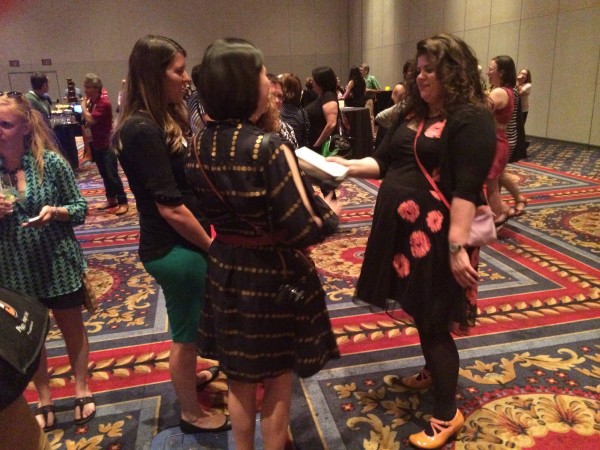
Author Rainbow Rowell (right) and fans at the Printz ceremony. Photo by Robin Brenner.
Before leaving the banquet hall, I was inducted into the final, unofficial tradition of collecting all of the half empty bottles from the banquet tables and carrying them outside to enjoy a few more glasses while chatting with colleagues in the hallway. I can’t imagine a better way to end the evening. Read the full text of Brian Floca’s Caldecott acceptance speech and Kate DiCamillo’s Newbery acceptance speech.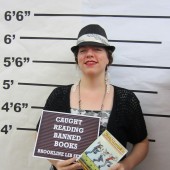 Robin Brenner is Teen Librarian at the Brookline Public Library in Massachusetts. When not presenting programs and offering reading guidance, she writes features for publications including VOYA, The Horn Book, and Library Journal. She is an active member of YALSA and has served on awards committees including those for the Margaret A. Edwards Award, the Boston Globe-Horn Book Award, and the Will Eisner Comic Industry Awards. She is currently serving on the 2015 Michael L. Printz Award Committee.
Robin Brenner is Teen Librarian at the Brookline Public Library in Massachusetts. When not presenting programs and offering reading guidance, she writes features for publications including VOYA, The Horn Book, and Library Journal. She is an active member of YALSA and has served on awards committees including those for the Margaret A. Edwards Award, the Boston Globe-Horn Book Award, and the Will Eisner Comic Industry Awards. She is currently serving on the 2015 Michael L. Printz Award Committee. RELATED
The job outlook in 2030: Librarians will be in demand
The job outlook in 2030: Librarians will be in demand
ALREADY A SUBSCRIBER? LOG IN
We are currently offering this content for free. Sign up now to activate your personal profile, where you can save articles for future viewing






Add Comment :-
Be the first reader to comment.
Comment Policy:
Comment should not be empty !!!